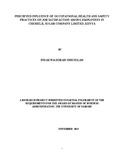| dc.contributor.author | Indakwa, Dorah O | |
| dc.date.accessioned | 2013-11-20T05:42:47Z | |
| dc.date.available | 2013-11-20T05:42:47Z | |
| dc.date.issued | 2013-11 | |
| dc.identifier.citation | A Research Project Submitted In Partial Fulfillment Of The Requirement For The Award Of The Degree Of Master Of Business Administration School Of Business, University Of Nairobi | en |
| dc.identifier.uri | http://erepository.uonbi.ac.ke:8080/xmlui/handle/123456789/59504 | |
| dc.description.abstract | Employees in the sugar industry are exposed to many hazards at their workplace and this
is likely to influence their levels of job satisfaction if the correct measures are not put in
place by their employers. The most affected employees are those who work in factory
and agriculture departments ( field services and production). The objective of this study
was to determine the perceived influence of occupational health and safety practices on
job satisfaction among employees of Chemelil Sugar Company Limited. The research
design was cross-sectional survey design and a structured questionnaire was used to
collect data which was analyzed using descriptive statistics including percentages, means
and standard deviations. Correlation analysis was also used to determine the influence of
occupational health and safety practices on job satisfaction. Out of the targeted 110
respondents, only 84 completed the questionnaires representing a response rate of 76%.
The research established that occupational health and safety practices influence job
satisfaction. The majority of respondents had a positive perception of occupational health
and safety practices were in place despite the fact that safety training was rated low in
terms of the mean score. They agreed that there were accident prevention measures in
place, wellness programmes and health care was provided at the company clinic for both
occupational and non-occupational ailments. It was established employees that were
satisfied with the quality of health services at clinic, emergency care given to workers
injured while on duty as well as the referral services to medical cases that are beyond the
scope of the company clinic. Respondents were also satisfied with the wellness
programmes and health information provided during the campaigns and outreaches. The
frequency of the wellness programmes was rated relatively low despite their satisfaction
with the services provided during the campaigns. The adjusted R2 was 0.718 showing that
there was 71.8% of the variation in job satisfaction which is accounted for by the
combined effects of wellness programmes, safety training and education, accident
prevention measures and health practices. This shows a strong correlation between
occupational health and safety practices and job satisfaction. The respondents were not
satisfied with the frequency of refresher training on safety as well as training during
change of jobs and on the use of new equipment. It was recommended that the
management of the company facilitate more safety training to equip workers with safety
skills which enable them reduce accident rates at the workplace. | en |
| dc.language.iso | en | en |
| dc.publisher | University of Nairobi | en |
| dc.title | Percieved influence of occupational health and safety practices on job satisfaction among employees in Chemelil sugar company limited, Kenya | en |
| dc.type | Thesis | en |
| local.publisher | School of Business | en |

